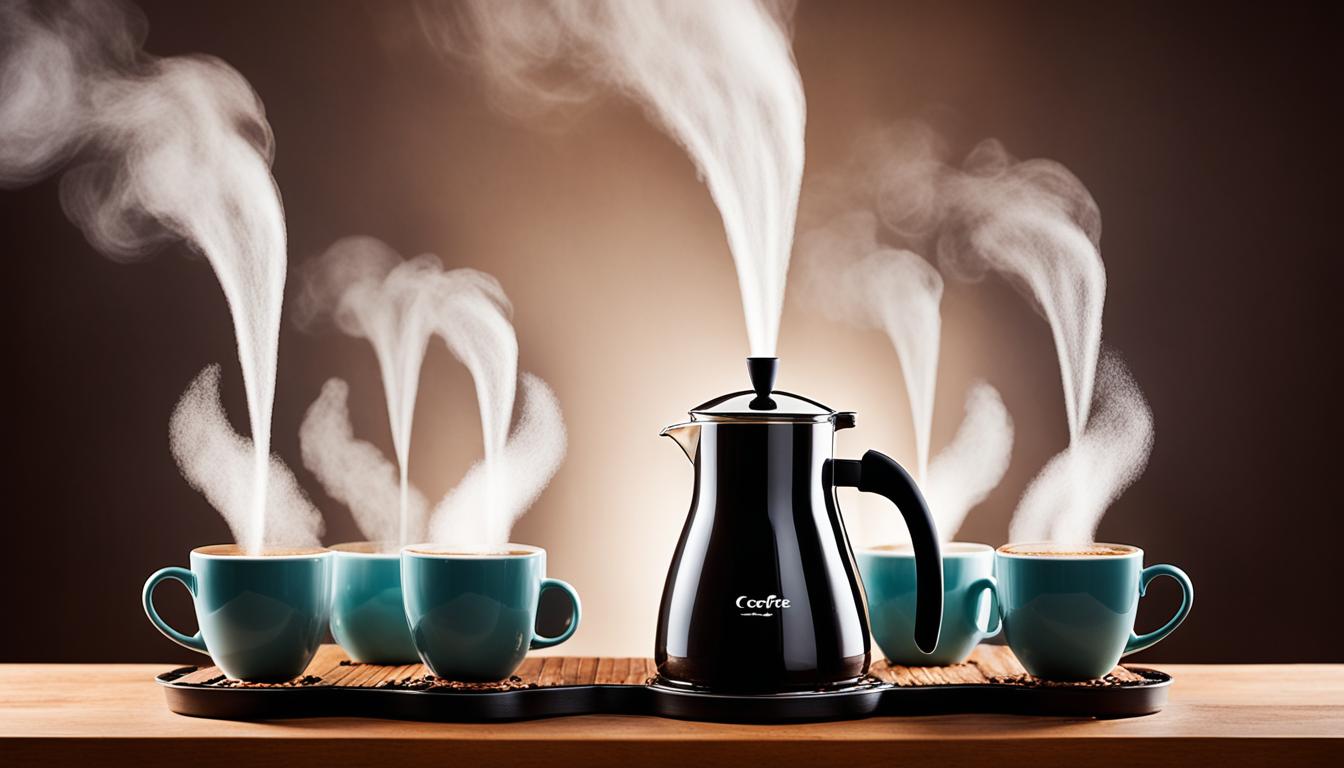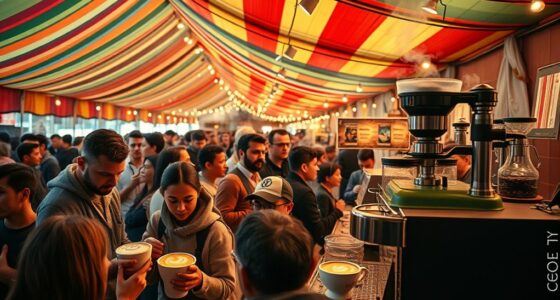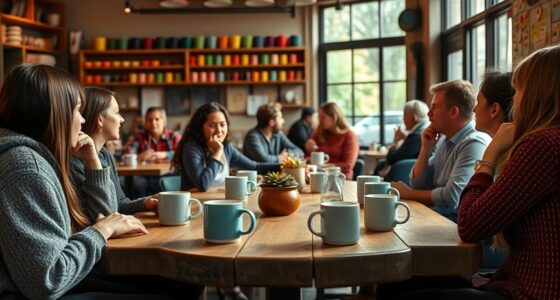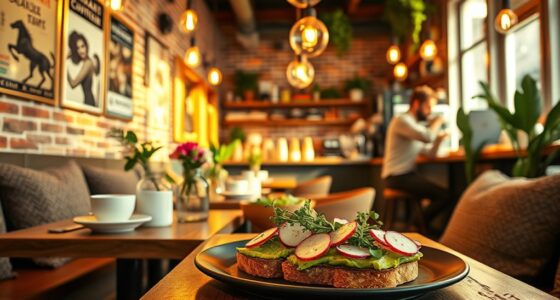In “Before the Coffee Gets Cold,” you step into a charming Japanese cafe where, following specific rules, customers can time travel but only within the cafe’s confines. Penned by Toshikazu Kawaguchi, this narrative weaves emotional depth and introspection through characters in search of closure and redemption. Each journey, limited to a particular table, explores themes such as memory, regret, and personal growth. The writing is praised for its simplicity and clarity, with differing critical reviews emphasizing strengths in character development and storytelling. Subsequent sequels and adaptations enhance the narrative’s emotional impact and thematic complexity, providing additional captivating tales within the cafe.
Key Takeaways
- Set in Funiculi Funicula café, the story centers on time travel with strict rules and emotional resolutions.
- The narrative explores themes of time, memory, regret, and redemption through interconnected character stories.
- The main characters include barista Kazu and patrons seeking closure and growth.
- The book's prose is simple and clear, evoking strong emotional responses and mixed critical reception.
- Sequels and adaptations, like 'Tales from the Cafe', expand the story's reach and appeal.
About Toshikazu Kawaguchi

Toshikazu Kawaguchi, a renowned Japanese author, has captivated readers worldwide with his novel 'Before the Coffee Gets Cold' and its subsequent series. You may know Kawaguchi not only as a novelist but also as someone with a rich background in theater. His multifaceted career includes roles as a producer, director, and writer for the theatrical group Sonic Snail. This theatrical influence is evident in the way he crafts his narratives, bringing a sense of stage-like intimacy and immediacy to his novels.
The 'Coffee Gets Cold Series' has achieved international recognition, a testament to Kawaguchi's compelling storytelling and nuanced character development. His unique writing style, honed through years in theater, has garnered both critical acclaim and commercial success.
Kawaguchi's other works, such as 'COUPLE,' 'Sunset Song,' and 'Family Time,' further showcase his versatility and depth as a writer, each gaining their own share of accolades.
It's worth noting that 'Before the Coffee Gets Cold' has also been adapted for the screen, broadening its reach and cementing Kawaguchi's status as a significant contemporary author. His ability to weave intricate tales that resonate with a global audience underscores his literary prowess and the universal appeal of his stories.
Plot Overview

In 'Before the Coffee Gets Cold,' the story unfolds within the quaint confines of the Funiculi Funicula café, where patrons can travel back in time under a set of strict, unyielding rules. The narrative centers around this unique coffee shop, where the primary draw is its time travel feature, attracting individuals hoping to revisit specific moments in their past. However, the experience comes with limitations, ensuring that the outcomes of the present and future remain unaffected by these temporal journeys.
Patrons sit in one specific seat that facilitates time travel, and they must return before their coffee gets cold. Despite the unchangeable past, the characters often find closure, understanding, or emotional resolution from these brief excursions. This creates a poignant exploration of human relationships and the impact of past actions on individual growth.
To visualize the setting and the story's dynamics, consider these key elements:
- The cozy, dimly-lit atmosphere of the coffee shop, creating an intimate and almost mystical environment.
- The solitary, special seat, always accompanied by a steaming cup of coffee.
- The characters' heartfelt conversations, underscoring the emotional weight of their time-traveling endeavors.
This distinctive blend of fantasy and reality offers a reflective look at the immutable nature of the past and the endless possibilities the future holds.
Time Travel Rules

The rules for time travel in 'Before the Coffee Gets Cold' are both strict and essential, guaranteeing that each journey remains a poignant yet controlled experience. These constraints are vital to maintaining order and preventing unintended consequences. Time travel is confined to a specific café, and more precisely, a particular table within it. To start on a journey, you must sit at this table and drink a cup of coffee, with the condition that you return before the coffee gets cold.
The table below illustrates the key rules:
| Rule | Description |
|---|---|
| Location | Time travel can only occur in a specific café. |
| Table | You must sit at a designated table to time travel. |
| Coffee | You must drink coffee, returning before it cools. |
| Consequences | Breaking rules results in penalties and potential curses. |
These strict rules ensure that actions taken in the past do not alter the present or future timeline. This highlights the importance of adhering to guidelines to avoid negative repercussions. The novel's time travel rules emphasize the need for careful consideration and restraint, underscoring the delicate balance between the past, present, and future.
Central Themes

When you delve into the central themes of 'Before the Coffee Gets Cold', it's crucial to recognize how the concepts of time and memory intertwine with regret and redemption.
The narrative highlights how characters grapple with their past choices, seeking solace or closure despite knowing they can't alter the past.
This exploration of personal dilemmas and emotional struggles underscores the poignant message that while the past is unchangeable, the act of facing it can lead to profound personal growth and understanding.
Time and Memory
Time and memory intertwine in 'Before the Coffee Gets Cold,' revealing how exploring the past shapes our present and future. This novel delves into the complexities of time travel and memories, offering a unique perspective on how past experiences influence current choices and relationships. The characters grapple with the limitations of altering the past, confronting their own regrets, hopes, and unresolved emotions in the process.
The narrative unfolds within the setting of a magical café, where patrons can travel back in time, but only for the duration it takes for their coffee to cool. This creates an intricate exploration of how memories shape identities and the paths individuals choose to follow. Through this lens, the novel emphasizes the importance of acceptance and living in the moment.
Consider the following imagery:
- A cup of coffee cooling on a table – symbolizing the fleeting nature of time and the urgency to make the most of it.
- A clock on the café wall – representing the constant passage of time and its impact on our lives.
- A photo album filled with cherished memories – highlighting the significance of our past in shaping who we're today.
This exploration resonates deeply with themes of nostalgia and self-discovery, making 'Before the Coffee Gets Cold' a poignant reflection on time and memory.
Regret and Redemption
In 'Before the Coffee Gets Cold,' characters confront deep-seated regrets and seek redemption within the limited moments granted by the magical café. Regret permeates the lives of those who visit the café, driving them to revisit past moments in an attempt to alter their emotional landscapes. These characters grapple with sacrifices, missed opportunities, and the emotional weight of their past decisions, demonstrating the profound impact that regret can have on one's present and future.
The novel intricately explores the complexities of redemption, as characters yearn to change their past actions and find solace in the present. Through the unique time-travel element, the book presents the idea of second chances, allowing characters to pursue redemption even in the face of irreversible events. This pursuit isn't always about changing the past but rather understanding it and making peace with it.
Readers are drawn into the emotional journeys of these characters, observing how they confront their regrets and seek redemption through the limited opportunities provided by the magical café. This exploration underscores the notion that while we can't change the past, we can find ways to reconcile with it and move forward.
Character Analysis

Each character in *Before the Coffee Gets Cold* offers a unique lens through which we explore themes of love, sacrifice, and personal growth. The barista Kazu and the four main customers are central to understanding the emotional depth and complexities that drive the story's interconnected narratives. Their journeys revolve around the café's special ability to facilitate time travel, allowing them to revisit the past or glimpse the future.
- Kazu: As the barista, Kazu serves as the guardian of the café's mystical time-travel rules. Her calm demeanor hides a profound understanding of human nature and the significance of choices and limitations.
- The Customers: Each customer has a deeply personal reason for wanting to time travel. Whether it's seeking closure, expressing unspoken feelings, or making peace with past decisions, their stories highlight the importance of human connections and acceptance.
- Interwoven Lives: The narratives of these characters are intricately linked, creating a tapestry that emphasizes how individual actions and emotions can ripple through time, affecting not just the person but also those around them.
Through these character arcs, the novel explores how people grapple with regrets and work towards personal growth, all within the boundaries of time's immutable flow.
Literary Style

The enchanting simplicity of *Before the Coffee Gets Cold*'s prose draws you into its world, allowing the emotional gravity of its themes to resonate deeply. The writing style is simple, clear, and direct, which guarantees that the emotional and moral implications of the story shine through effectively. Although some readers might find the prose too plain, it mirrors the magical yet mundane setting of the café, where time travel intertwines with everyday dilemmas.
Character development is a notable strength of the book, with interconnected stories that highlight the connections between human lives. The straightforward prose serves as a vehicle for exploring themes of regret, love, and the passage of time in a manner that's both poignant and impactful. This style enables you to focus on the emotional depth and complexity of the characters, enhancing your connection to their stories.
Critical Reception

Critics have shared a mix of opinions on *Before the Coffee Gets Cold*, highlighting both its emotional depth and occasional narrative unevenness. The book, a collection of short stories centered around time travel within a quaint café, has received varied feedback from notable reviewers.
For instance, Ian J. Battaglia praised the book's profound emotional resonance, emphasizing how the characters' experiences tug at the heartstrings. On the other hand, Terry Hong pointed out that the narrative occasionally feels uneven, suggesting that some stories lack the consistency found in others.
Courtney Rodgers compared the book to the whimsical TV series *Pushing Daisies*, drawing parallels between the two regarding their unique blend of fantasy and everyday life. Joseph P. Kelly gave the book a glowing five-star rating, particularly highlighting the empathetic portrayal of the characters, which he found deeply moving.
Reviews from sources like The Christian Science Monitor and Chicago Review of Books reflect a spectrum of opinions, underscoring the book's ability to evoke strong reactions from its readers.
Here are some key takeaways from the reviews:
- Emotional Resonance: Praised for touching the readers' hearts.
- Narrative Unevenness: Criticized for occasional inconsistencies.
- Comparative Media: Likened to *Pushing Daisies* for its magical realism.
Sequels and Adaptations

In exploring 'Before the Coffee Gets Cold' sequels and adaptations, you'll find that the series expands its storyline horizons with titles like 'Before the Coffee Gets Cold: Tales from the Cafe' and 'Before We Say Goodbye,' allowing for richer character development and deeper emotional connections.
The cinematic adaptation, 'Cafe Funiculi Funicula,' and the upcoming TV series demonstrate the story's significant impact on different media platforms, broadening its reach and appeal. These adaptations not only bring the magical café to new audiences but also offer fresh perspectives on its timeless themes.
Expanding Storyline Horizons
As 'Before the Coffee Gets Cold' captivates readers worldwide, its sequels and adaptations continue to expand the narrative's reach and depth. The series, beginning with 'Before the Coffee Gets Cold: Tales from the Cafe', introduces new dimensions to the original concept, cementing its place in contemporary literature.
The sequels have steadily built upon the initial premise, culminating in three additional works and a fourth awaiting translation into English. This expansion signifies the persistent demand and fascination with Toshikazu Kawaguchi's storytelling.
To visualize this growth, consider the following:
- Literary Sequel Expansion: The series comprises 'Before Your Memory Fades' and 'Before We Say Goodbye', each exploring fresh, emotionally resonant stories set within the cafe's magical confines.
- Cinematic Adaptation: The 2018 film 'Cafe Funiculi Funicula' brought the narrative to the big screen, allowing audiences to experience the tale visually and broadening its appeal.
- Television Series Development: Current efforts by SK Global and The Jackal Group to develop a TV series adaptation further indicate the story's enduring charm and broadening horizon.
These adaptations and extensions underline the story's universal themes and its capacity to engage audiences across various media platforms, enriching the original's legacy.
Character Development Evolution
The character development in the sequels and adaptations of 'Before the Coffee Gets Cold' intricately enhances the narrative's emotional depth and complexity. Each installment, from 'Tales from the Cafe' to 'Before We Say Goodbye,' explores further into the lives of the characters, enriching the story with new dimensions of human experience and the poignant notion of time travel. The sequels build on the foundation of the original, examining different facets of regret, love, and redemption.
| Sequel Title | Year | Key Themes |
|---|---|---|
| Tales from the Cafe | 2017 | Regret, second chances |
| Before Your Memory Fades | 2018 | Memory, loss, acceptance |
| Before We Say Goodbye | 2021 | Farewell, closure, moving forward |
| Fourth Sequel (Japanese) | 2023 | Unreleased in English |
In the adaptations, the characters gain even more depth, resonating deeply with audiences. The 2018 film 'Cafe Funiculi Funicula' and upcoming TV series adaptation by SK Global and The Jackal Group bring these nuanced personalities to life, offering a visual and emotional exploration of their journeys through time. The interconnected narratives across these mediums highlight the enduring impact of the characters' emotional evolution, making each story a compelling examination of the human condition.
Cinematic Adaptations Impact
Amid the journey from page to screen, 'Before the Coffee Gets Cold' adaptations profoundly amplify the story's emotional richness and visual allure. The novel's shift to a film titled 'Cafe Funiculi Funicula' in 2018 brought the time-traveling narrative to life, capturing the essence of the original short story while adding a cinematic depth that resonated with audiences. This adaptation not only visualized the quaint cafe setting but also deepened the connection to its characters' emotional journeys.
In addition, the development of a Netflix series by SK Global and The Jackal Group signifies the story's enduring appeal and potential for expansive visual storytelling. This series aims to explore new dimensions of the narrative, potentially drawing from the three sequels and the yet-to-be-translated fourth book. Such an adaptation allows for:
- Enhanced character development – Longer screen time lets you explore deeper into each character's backstory.
- Visual storytelling – The picturesque cafe and its time-traveling premise come to life through detailed set designs.
- Broader audience reach – Netflix's platform can introduce the story to a global audience, expanding its fan base.
These adaptations highlight the timeless emotional resonance and character-driven narratives of 'Before the Coffee Gets Cold.'
Reader Reviews

With over 59,000 reviews and a 3.70 rating on Goodreads, 'Before the Coffee Gets Cold' sparks a wide range of reactions from readers. Some find themselves deeply moved by the story instead of just enjoying a cup of coffee while reading it. The book's unique concept and thought-provoking themes resonate with many, who praise its well-developed characters and interesting plots. These readers often highlight the emotional impact, sharing experiences of shedding tears of happiness or understanding at the end of each chapter.
However, opinions on the storytelling and character development are mixed. While some appreciate the neatly wrapped-up lessons, others feel the narrative could be more engaging. The book's translation has also been a point of discussion, with some readers finding it challenging, yet still acknowledging the profound and provocative nature of the story.
Cultural perspectives play an essential role in how the book is perceived. Readers from various backgrounds appreciate the unique lens through which the story is told, even if they encounter occasional difficulties with the translation.
Frequently Asked Questions
Is Before the Coffee Gets Cold Worth Reading?
Considering whether a book is worth reading depends on your interests. If you appreciate stories that explore themes like love, sacrifice, and emotional struggles, you might find it compelling.
Although some readers have mixed feelings about the pacing and character development, others praise its emotional depth and unique storytelling.
Weighing these factors can help you decide if it's a good fit for your reading preferences.
What Is the Point of Before the Coffee Gets Cold?
Think of time as a river; 'Before the Coffee Gets Cold' delves into how maneuvering through this river impacts human relationships and personal choices.
The book's point is to highlight the importance of living in the present while acknowledging past regrets and love. Through time travel, it emphasizes that actions have consequences and underscores the value of seizing the moment before it's too late.
What Is the Summary for Before the Coffee Gets Cold?
In 'Before the Coffee Gets Cold,' you find a unique Tokyo café where patrons can time travel under strict conditions. The story explores barista Kazu and four customers, each seeking to revisit pivotal moments in their lives.
The novel delves into themes of love, sacrifice, and the immutable nature of the past, emphasizing human connections.
Its sequels and adaptations further investigate these elements, showcasing the story's broad appeal.
Does Before the Coffee Gets Cold Make You Cry?
Notably, many readers report that the book elicits tears, often tears of happiness or understanding. This emotional response is primarily due to its strong themes of love, sacrifice, and regret. The character development and poignant storytelling create deeply resonant moments.
While individual reactions vary, the narrative's bittersweet nature and exploration of deep human emotions can lead to tears and reflection. Therefore, 'Before the Coffee Gets Cold' often makes readers cry.
Can I Still Enjoy Before the Coffee Gets Cold with Braces?
Yes, you can still safely drink coffee with braces while enjoying “Before the Coffee Gets Cold.” Just make sure to use a straw to minimize contact with your teeth and avoid staining. Rinse your mouth thoroughly afterward to prevent any lingering coffee residue from affecting your braces.
Conclusion
To sum up, 'Before the Coffee Gets Cold' is a compelling narrative that intricately weaves time travel with deeply human themes, making it a rewarding read.
You might think time travel is overused, but Kawaguchi's unique rules and character-driven stories breathe new life into the concept.
This novel offers more than just a fantastical premise; it provides a heartfelt exploration of love, loss, and second chances, ensuring an engaging experience for any reader.









